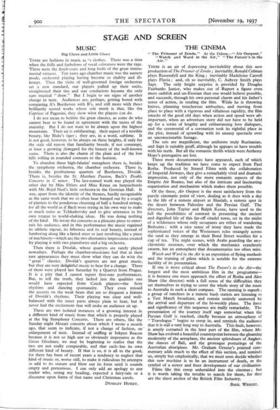STAGE AND SCREEN
MUSIC
Big Claus and Little Claus THERE are fashions in music as 'n clothes. There was a time when the frills and furbelows of vocal coloratura were the rage. There were the frock-coats and long locks of the great instru- mental virtuosi. Ten years ago chamber music was the austere mode, orchestral playing having become so shabby and ill- kempt. Then the visits of well-groomed foreign orchestras set a new standard, our players pulled up their socks, straightened their ties and star conductors became the only sure musical " draw." But I begin to see signs of another change in taste. Audiences are, perhaps, getting bored with comparing A's Beethoven with B's, and still more with those brilliantly scored works whose sole merit is that, like the Caprices of Paganini, they show what the players an do.
I do not mean to belittle the great classics, as some do who cannot bear to be found in agreement with the tastes of the majority. But I do not want to be always upon the highest mountains. Their air is exhilarating; their aspect of a terrible beauty, like Blake's tiger ; they are, in a word, sublime. It is not good, however, to be always on these heights, if only for the stale old reason that familiarity breeds, if not contempt, at least a growing disregard for the beauty of the well-known scene. There is also the charm of the plain and of the low hills rolling in rounded contours to the horizon.
To abandon these high-falutin' metaphors there is, besides the symphony orchestra, the chamber orchestra. There is, besides the posthumous quartets of Beethoven, Dvoilk. There is, besides the St. Matthew Passion, Bach's Double Concerto in C minor. The last-named work was played the other day by Miss Ehlers and Miss Kraus on harpsichords with Mr. Boyd Neel's little orchestra in the Grotrian Hall. It was, apart from the identity of the themes, hardly recognisable as the same work that we so often hear banged out by a couple of pianists to the ponderous churning of half a hundred strings, for all the world as if Bach were trying in his own way to make as much noise as Tchkaikovsky and to give utterance in his own tongue to world-shaking ideas. He was doing nothing of the kind. He wrote the concerto as a pleasant piece to enter- tain his audience, and in this performance the music regained its athletic vigour, its litheness and its real beauty, instead of lumbering along like a fatted steer or just revolving like a piece of machinery—which are the two alternative impressions created by playing it with two pianofortes and a big orchestra.
Then there is Dvorak, whose quartets are rarely played nowadays. Perhaps the chamber-musicians feel that at their rare appearances they must show what they can do with the " great " classics. Dvorak's quartets are not great music, but they are very delightful music to hear for a change. Three of them were played last Saturday by a Quartet from Prague. It is a pity that I cannot report first-rate performances. But, to tell the truth, they lacked just the qualities one would have expected from Czech players—the fiery rhythms and dancing spontaneity. They even missed the accents on the weak beats that are so frequent a feature of Dvoiik's rhythms. Their playing was clear and well- balanced with the inner parts always plain to hear, but it never had the excitement that will make an audience sit up.
These are two isolated instances of a growing interest in a different kind of music from that which is properly played at the big -Symphony Concerts. There are others, like the Sunday night Mozart concerts about which I wrote a month ago, that seem to indicate, if not a change of fashion, an enlargement of taste. Instead of sniffing at Inkpen Beacon because it is not so high nor so 'obviously impressive as the Gross Glockner, we may be beginning to realise that the two are not really comparable, and that each L has its own different kind of beauty. If that is so, it is all to the good, for there has been of recent years a tendency to neglect that kind of music or, worse still, to make it ridiculous by attempts to add to its stature and blow out its form until it sounds empty and pretentious. I can only add an apology to any reader who, seeing my heading, expected a fairy-tale or a discourse upon Santa of that name and Christmas carols.
DYNELEY HUSSEY.
















































































































 Previous page
Previous page